THE HELP by Kathryn Stockett
By Lee Peoples | May 1st, 2010 | Category: Book Reviews, Fiction | 2 comments The Help, a New York Times bestseller by Kathryn Stockett, is a novel depicting the personal relationship between black maids and the white families, especially the women, who employ them. The story is set in a fictional section of Jackson, Mississippi, from 1962 to 1964. It tells a story of what it was like being a black maid in the Civil Rights era in Jackson, Mississippi, as seen through the eyes of two black maids and one liberal white woman, uniquely three first person narrators.
The Help, a New York Times bestseller by Kathryn Stockett, is a novel depicting the personal relationship between black maids and the white families, especially the women, who employ them. The story is set in a fictional section of Jackson, Mississippi, from 1962 to 1964. It tells a story of what it was like being a black maid in the Civil Rights era in Jackson, Mississippi, as seen through the eyes of two black maids and one liberal white woman, uniquely three first person narrators.
Three women, seemingly as different from one another as can be come together for a clandestine project that will put them all at risk and change their lives and the lives of others in a way neither of them has imagined. In the midst of the Civil Rights era, race relations in Mississippi are already dangerous. And Miss Skeeter, a young white woman—twenty-three years old and a recent graduate of Ole Miss, with ambitions of becoming a writer—elicits the help of two black maids.
Upon graduating, Miss Skeeter returns to her family home where she resumes living with her very proper but callous mother and her very kind and gentle father. Her older brother is away in law school at LSU in New Orleans. She is disappointed when she discovers Constantine, the maid who raised her and taught her kindness and self-respect, has been replaced by another black maid. Her mother had fired her after twenty-nine years, but no one will tell her why. “It was a colored thing,” her mother responds when pressed for an explanation. Neither will anyone tell her how to contact Constantine.
With personal problems of her own and her mother clamoring for her to get married and start a family as have her two friends and former college roommates—but she doesn’t even have a boyfriend—she takes a job at the local newspaper writing a column on housekeeping. But knowing nothing of this subject, she befriends her friend Elizabeth’s maid, Aibileen, who helps her write her column. And as always, one thing leads to another. At the suggestion of a woman publisher in New York to write about something she is passionate about, she chooses this subject and embarks upon the writing project that brings her closer to Aibileen and Aibileen’s friend Minny.
Minny is a great cook, but she often gets into trouble with her white employers because of her mouth. The only reason she hasn’t been fired by Miss Walter, the mother of another of Miss Skeeter’s friends, Miss Hilly, she says is because Miss Walter “be deaf as a doe-nob” . . . until Miss Hilly accuses her of theft and fires Minny herself so that she can now place her mother in a home.
Over a period of time they and other black maids meet in secret and write a book entitled simply Help, which reveals secrets that heretofore have been sacred. But injustices have caused these maids and Miss Skeeter to put themselves at great risk. All names are changed to protect their identities, and the author is Anonymous. Because of the demands for change in race relations in the South, Blacks are suffering even more abuses: hangings, murders, beatings. The men are being fired. Black maids who have been entrusted with the care, nurturing, and raising of white children are being sent to prison on such bogus charges as stealing the silverware.
But true to history, things do change for the better, in some cases at great cost to some of the characters, white and black. Though unique in its style—three first person narrators—this piece of historical fiction is alternately heartwarming, troubling, and at times downright hilarious. The attempt to capture the dialect of the South often challenges the reader’s comprehension. In some cases it took me a few pages to decipher her meaning, but soon my eyes and ears adapted to the enunciations/pronunciations intended. A few incidents were anachronistic, but the author explained her reasons for taking them out of their proper time and placing them in this setting. See the special section after her “Acknowledgements” at the end of the book, entitled “Too Little Too Late” and subtitled “Kathryn Stockett, In Her Own Words.” In this section, near the end (page 450), she sums up the feelings that led her to this subject with a quote from “Grady’s Gift,” the Pulitzer Prize-winning article by Howell Raines:
“There is no trickier subject for a writer from the South than that of affection between a black person and a white one in the unequal world of segregation. For the dishonesty upon which a society is founded makes every emotion suspect, makes it impossible to know whether what flowed between two people was honest feeling or pity or pragmatism.”
So, confronted with this quandary, Kathryn Stockett passionately writes her first novel about the troubling times of segregation and integration in the 1960s. It is truly deserving of its bestseller status. I was, however, left wondering why she offered no conclusion to the incident involving the naked white man. Clearly, Miss Celia’s protection of Minny, her black maid, contributed to the theme of the mutual love between so many of the black employees and their white employers and the lengths they would go to protect each other; yet I still wanted to read the author’s resolution.
Oprah, how did you miss this one?
ISBN978-0-399-15534-5
Reviewed by Lee L. Peoples









That’s okay Diane, I’m sure she won’t miss you as a reader. She has thousands of us, who can and will, read more of her work. 😛
I think Oprah is thinking clearly to leave this off her must-read list. I enjoyed the book thoroughly but was greatly put off by her condescending comments in the section “Too little, too late.” I tried to think that perhaps the poor thing was just worried that she might be making her home state and perhaps her parents friends look bad with her novel, and then thought, my god, just suck it up. The treatment of blacks -was- bad, the Jim Crow laws -were- evil, and if you’re looking for the moral confusion of people acting inhumanely, who also happen to be human, just watch “Playing for time.” I wish she had left the commentary off, as I doubt I’ll be pulled to read anything else she may write.